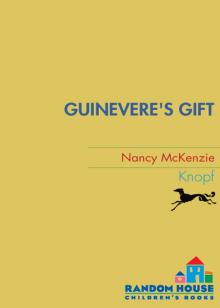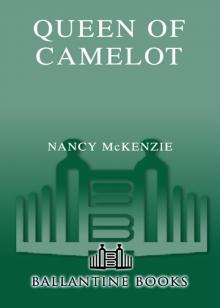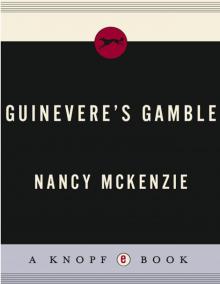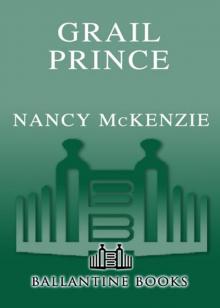- Home
- Nancy McKenzie
Queen of Camelot Page 9
Queen of Camelot Read online
Page 9
There was much toasting my health, and conversation about the Saxon wars, which was supposed to be above the ladies’ heads, but which I listened to avidly. Elaine kept her eyes on her plate like any shy, young maid being courted for the first time. But I knew it was not modesty but misery that was blanketing her high spirits. And Gwillim, who should at least have shown some interest, if only curiosity, about the girl his father offered for, either looked at his own plate or looked at me. Try though I might, I could not engage him in conversation. He only responded “Yes, my lady” or “No, my lady” or, when I referred to the time we had found the wild ponies, “I pray you won’t mention it, my lady.” What could one do? At least Gwarthgydd had news of home. He and all his brothers were in the High King’s service now, and he had nothing but praise for Arthur. What a leader! Calm, wise, purposeful, never a hasty move or an unplanned foray; gentle with women, just with men, ruthless with his enemies. He was full of laughter and good humor; men feared his rare anger; he fought not with heat but with unswerving, cold purpose.
When I could get him off the subject of Arthur, he told me of home. He had married two of his daughters off and seemed glad to be rid of them. His brothers had large families, more than the King’s house at Cameliard could hold, and lived on their own lands. That left him with Glynis, two young daughters, Gwillim and his two older sons, who took turns soldiering and tending the kingdom of Northgallis. I was still remembered there, he said. Never had the black Celts of our family produced anyone so fair. I nodded toward the blond Alyse, my mother’s sister, and her daughter, the fair Elaine. Gwarth smiled. Yes, he said, everyone knew where it came from, and he wouldn’t mind at all having another fair maid in Northgallis. I felt obliged to tell him it looked unlikely. He glanced unhappily at Gwillim and agreed.
“King Pellinore seems pleased with the match, though.”
“Probably because it means his precious daughter would be next door,” I told him. “But I assure you, Gwarth, the queen feels strongly that her daughter will not be forced into a marriage against her will—and the lady Elaine has a strong will.”
“Hmmmm. Well, I expect you’re right. I can’t say Gwill cares at all. Perhaps it’s just as well. He won’t look at anyone but you, Gwen. He never has.”
I blushed. It was absurd. Gwillim was my nephew! I told Gwarth how happy I was to see them both and that King Pellinore could not have brought me a better birthday present.
He laughed aloud. “We’re not your present, Gwen. King Pellinore has brought you a rare gift, more precious than any Welsh prince could ever be to you.”
Pellinore heard him and rose. “I confess that the High King Arthur has done me a great honor. In return for my services in the last battle, he asked me to name anything I wished, and if it was in his power to give it me, he would.” I saw heads turn and nod at this extraordinary generosity. King Pellinore smiled. “I thought of the young lass I keep in my care and told the High King I wished to bring a birthday gift to my ward. I asked him for a mare from his own stables.”
I gasped, and everyone stared. Such a gift was unheard of! All of the fine horses Lancelot imported from Gaul, and their colts and fillies, were kept for training or for breeding stock. None had ever left the High King’s stables. And mares were prized above all. I stared at Pellinore in amazement.
“Did—did he agree?” I whispered.
Pellinore laughed. “The mare is in the stables now. The High King keeps his promises.”
I could barely contain my excitement. If she’d been stabled as soon as Pellinore arrived, she must have been in the barn when Peleth and I returned from our ride! I berated myself for not having gone in to tend the horse myself—I could have seen her then. As it was, I would not be allowed to go out until morning.
“Oh, dearest Pellinore!” I cried, jumping from my seat and running into his arms. “How can I ever thank you enough! What is she like? Her color, her stride, her spirits? Did anyone ride her on the journey home? Where is he, that I may ask?”
King Pellinore laughed and sat me on his lap, just the way my father had been wont to do when I was small. “No one rode her, young lady. She is yours. She’s a filly, but two years old, and a dark dappled gray. But she will be as white as the High King’s charger one day, you may be sure. She is not fully trained—I leave that to you—but what lessons she has had, she has had from the best. Young Lancelot bred her and trained her himself, and a finer hand with a horse I never hope to see. He hated to part with her and was sure I was exaggerating your skill.” He pinched my cheek. “I told him you rode bareback, as he does himself, and flew like the west wind over whatever lay in your path.” I blushed violently; I had thought my jumping a secret. “He said to me, ‘There’s a maid after my own heart’ and let me take the mare. You may see her in the morning, Gwen. Happy birthday.”
I was beside myself with joy and anticipation. When dinner was over, I kissed Gwarth and Gwillim good night, paid my respects to Queen Alyse, and flew upstairs to my room. Elaine was sullen, whether with jealousy over my great gift or with a headache from her weeping, I knew not, and I cared not. A mare from the High King’s stables! It was too wonderful to be true! I said my evening prayers in a hurry. God had not made me a woman that day, after all, but now I hardly cared.
I was up at dawn, dressed quietly in my doeskin leggings, crept out without waking Elaine or the nurses, and raced to the stables.
Stannic was up, and he grinned to see me, not surprised. “This way, my lady. I gave her the corner box. It’s the biggest and she can look out over the meadow.”
I stopped at the door and held my breath. She was a beauty! Tall, slender, straight legs, long, arched neck, flat croup, tail held high. She was looking out her window when I came up but, hearing my step, swung around to see me. Her face was lovely: broad in the forehead but narrow in the muzzle, with fine, large dark eyes.
“Sweet Mary,” I whispered, opening the door a crack and slipping in. She was taller than I was, much taller than the Welsh mountain ponies I had grown up on, but lighter and finer than Peleth. Her coat was a dark dappled gray, with black legs, black mane and tail, and dark muzzle. I spoke to her softly, crooning an old Welsh tune, and held out my hand. She was nervous at first, but then stood calmly and let me approach. When I was near, she lowered her head and put her soft muzzle in my hand. Clearly, she had been brought up with no fear of men, which meant she had been well treated always. I stroked her gently, and she nuzzled me in return.
I slipped a halter on her and led her from the stall. She moved daintily, careful where she put her feet. I guessed she would be surefooted on rough ground. She did not look heavy enough to carry a soldier, but she must at least have carried Lancelot, so I was not afraid to mount her. I refused the bridle Stannic proffered, although it was very fine, with silver worked on the browband. She was only two, and likely tender-mouthed.
“Give me a leg up, Stannic.”
“My lady,” he protested, “surely you’re not going to try her without a bridle. You’ll not have control!”
“I have the halter and the rope. I can spin her in a circle if she looks to bolt. Have no fear.”
My eagerness made me impatient, and I was ready to climb the fence to mount her, but Stannic helped me against his better judgment.
How can I describe what it felt like to be astride of her? She was light and quick, she felt every shift of my seat, every touch of my leg. She quivered with eagerness, but when I stroked her neck and talked to her, she calmed under my touch. I let her walk around the stableyard and then onto the track that led down the gentle valley toward the sea road. It was a lovely spring morning, with dew on the grass and a cool mist rising. The sun was up, rose pink through the haze, and the hills were alive with birdsong. The filly danced along the track, swinging this way and that, pulling at the rope, wanting her head. I denied it to her, and she did not fight me, but bent her neck gracefully and walked on. She had been handled, I could see, with consummate gentleness; sh
e responded to the lightest touch. When we reached the valley floor, the track widened, and I let her move out a bit. What a fluid, ground-covering canter she had! It was easier to sit than the queen’s chair that rocked back and forth on curved braces. She tossed her head and snatched again at the rope, but I held her, and she obeyed. But I felt the power in her hindquarters and the desire to run that coursed through her. I had not intended to run her at all, not the first time, but she was convincing me. Before I could do it, I had to know if she would stop. I sat up and pulled back on the rope, squeezing my leg. She came back to me at once, slowed to a trot, and stopped. But she trembled in frustration.
“Oh, good girl, my beauty, my pretty, my love. For that you shall have your gallop on the beach.”
We trotted down the sea road and turned off along a woodland path that ran down to the shore. Suddenly, as the trees thinned out, the filly shied, screamed, and reared. I grabbed her mane to keep from sliding off, she whirled and tried to bolt back the way we had come, but I turned her and made her stand, facing the sea. She must never have seen the sea before! It must be as amazing to her as it was to me the first time I saw it. I stroked her neck, wet with the sweat of fear, and gradually she calmed.
I turned her away, and we rode along the dry shingle, where the sand is firm.
“All right, my lovely one, now let’s see what you can do.” And I gave her her head. She exploded out from under me so swiftly, I’d have fallen if I hadn’t buried my hands in her whipping mane. I clung there, bent over her withers, as the ground flew by and the salt spray stung my cheeks and the west wind brought tears to my eyes. She fairly flew over the ground—I felt nothing but speed, like a spear flying. She raced past the place where Peleth always slowed down, winded, and past the last trail up from the beach. I pulled the rope in vain; when she felt the pressure, she leaned against it, increasing her speed. The trees became blurs, the sea a pounding accompaniment to her hooves. There were treacherous rocks ahead, I knew, sharp, black boulders that protruded from the soft sand like wolf’s teeth—The Fangs they were called—and there was no way around them. They were a natural boundary. Fighting my panic so the mare would not sense it, I sang to her again, steadying my gulping breath, and straightened up as much as I could. Whether it was my song or the motion of my body I know not, but at last she slackened her pace, and by the time The Fangs came into view she was cantering easily, tossing her head, enjoying herself.
I brought her to a halt and turned her around. Her nostrils were flared wide, and her sides heaved, but she did not seem tired. She was not even lathered; any other horse I knew would have been dead.
“Well, my pretty one,” I said, patting her neck and her rump as we started the walk back, “you are in wonderful condition. You have been loved by someone who loves horses, that is easy to see. I think I must make it a goal of mine to meet someday this knight who raised you and thank him for this gift. Yes, when Elaine goes to Caer Camel, I shall go with her, to thank him. For while you are the High King’s gift, it was Lancelot who made you what you are. And I have a name for you now. I will name you Zephyr, after the west wind, for you fly as swiftly as the wind and yet are as gentle as the sea breeze. Someday I shall meet this great Sir Lancelot and thank him for my Zephyr.”
7 MERLIN
Gwillim’s visit was the first of many by Welsh princes. We had one or two a month, I believe, come to offer for Elaine’s hand. Alyse and Pellinore were proud and happy but they were guided by Elaine’s decision, and she always refused her suitors. At first she was barely polite, but as time wore on she, too, was flattered by the attention and grew condescendingly courteous. No one offered for me and in time Elaine passed from gloating into a genuine sorrow for my condition. I did not much mind the absence of suitors; my head was much too full of Zephyr to have room for men.
But Elaine’s pity nearly drove me to distraction. “I am ten times the rider she is,” I railed at Ailsa when we were alone, “and twice the seamstress! I can do figures in my head and read as well as anyone, and speak better Latin than most! And even though she is beautiful, she is vain about it, as if her beauty were something she had earned herself and not a gift of God! How can she be so cruel to me? In her eyes I am a poor, impoverished orphan—like Cam, the cripple—just because she has grown a bosom and I have not!”
Good Ailsa hugged me and calmed my weeping and told me, in her motherly way, that things would change as the wheel of time went round. The last would become first, she crooned, and the low made high. I frowned and looked at her askance: I never found Giselda’s prophecy comforting.
In the month of the Raven near the autumn equinox, almost five years to the day after his victory at Caer Eden, King Arthur wed Guenwyvar of Ifray. There had been much fighting during the summer, but the High King managed to find three weeks of peace in which to marry. Then, with his bride bedded and the elders satisfied, he went back to war. His young Queen was left in Caerleon, protected by his soldiers, with all the people daily watching her waistline to see if the High King had bred his heir in her. Elaine envied her, but I cannot say that I did.
King Arthur’s victories continued, and work continued on the new fortress of Caer Camel. One Gaius Marcellus, grandson of Ambrosius’ chief engineer, designed it—the fortifications, the groundwork, the buildings, and the open places. He had even given directions for the quarrying of the stone. The fortress was to be the biggest, strongest, and best defended in all the kingdoms, a gathering place for Britons, a warning to Saxons, a symbol to all of the High King’s power. And after the bishop of Caerleon had blessed the cornerstone, it was whispered behind doors, Merlin the Enchanter, in a ceremony of his own, had looked into the flames, foreseen a glorious future, and sanctioned its building. After that, Arthur gave the orders to proceed.
Merlin was at Caerleon for the High King’s wedding and stayed behind when Arthur and his troops rode north. He was the most trusted member of Arthur’s household, and the most feared, as well. The King’s sister Morgan was promised in marriage to Urien of Rheged, and since fighting in the east near Elmet required the High King’s presence, Merlin was left to escort the princess and her train to Rheged for her wedding. They left on a hot day in October and traveled north through Wales.
King Pellinore and Queen Alyse had attended the High King’s wedding but had not taken Elaine and me, much as we had begged to go. As a guilt gift, perhaps, they agreed to let us accompany them to meet the princess Morgan’s train and pay homage to her. Elaine and I were beside ourselves with excitement. Elaine and Queen Alyse were going to ride in a litter, and they thought it only right that I should, too, but I begged and pleaded with good King Pellinore to be allowed to ride my new mare. It was not unknown for ladies, especially when young, to travel on horseback; I was sure the only reason Elaine chose the litter was because she did not have a mount as fine as mine. When she had complained to her father that she had outgrown Welsh ponies he had given her Peleth, but she could barely handle him, old though he was. Pellinore at last gave in and said I could ride, but only if I rode Peleth. With tears of frustration, I begged him to allow me to ride Zephyr. He thought her too young, too flighty, but I convinced him by giving him a demonstration. In five months she had learned a lot and would do anything I asked. At the end of my demonstration, he was silent for a while, stroking her neck and looking up at me. At last he nodded.
“Use a saddle, for form’s sake,” was all he said.
We started out on a brilliant, crisp day, with sixty troopers in our party and twelve pack mules with all the tents, gear, and bridal gifts. I rode between King Pellinore and the litter, where he thought I was safest. In obedience to his wishes, I had on my best tunic of a dark, forest green, with a light-green mantle for warmth. I had woven threads of green and blue into Zephyr’s bridle and into her braided mane. I wondered if there would be anyone in the princess’ party who had known the filly. If so, I wanted to make sure a good report reached the knight who had trained her.
; With the cool weather and the crowd of horses, she was very excited, and harder to sit than I expected. King Pellinore shot me a look from under his bushy brows, but I only smiled in return and quietly sang to the mare. She settled down, as I knew she would, and by midday was perfectly calm and well behaved. On the evening of the third day we reached the meeting of the roads from Caerleon and Glevum. We had been there only an hour when the royal escort came in sight. From our tent, we watched them set up camp, admiring the fine horses and trying to see if we could distinguish any of the royal party. Elaine and I shared a tent with Ailsa, Grannic, Leonora, and Cissa—we were all in a fever, as eager to catch a glimpse of Merlin the Enchanter as of the princess Morgan. But it was many hours before we were called to audience. We changed into our finest gowns and followed King Pellinore and Queen Alyse through the crowd of troopers, courtiers, and guards, to the royal tent. The servants followed, bearing our gifts.
The princess Morgan, daughter of King Uther and Ygraine his Queen, sat on a gilded chair, dressed in a heavy red gown. Her hair was dark brown and decked with a circlet of red gold; around her neck and wrists hung jewels of every color, and on her fingers she wore rings of ruby, pearl, and sapphire. She was only fifteen—she looked twenty. Her eyes were a golden brown that did not suit her coloring; she was not pretty, really, but rather proud and distant. Now she was about to wed a major king, a man with lands wider than Lot’s or Pellinore’s, but a man old enough to be her father. No doubt her future had been a matter of negotiation among Arthur, Urien, and Queen Ygraine. I wondered if she dreaded going to it. I shuddered involuntarily. It was not fair that happiness in a woman’s life should depend so completely upon a man.
Courtiers crowded around her at a respectful distance while the servants laid our gifts at her feet, and King Pellinore performed the introductions. She smiled as Elaine made her curtsy, but at me she only stared and barely nodded. I flushed with embarrassment—it was almost a slight! What had I done?

 Guinevere's Gift
Guinevere's Gift Queen of Camelot
Queen of Camelot Guinevere's Gamble
Guinevere's Gamble Grail Prince
Grail Prince Prince of Dreams
Prince of Dreams